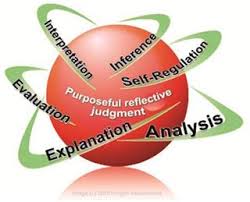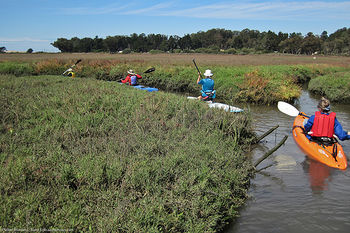Practical models and frameworks
| Learning and Teaching in Practice | |
|---|---|
| Module 2: Adult learning theory and Praxis | |
| Critical thinking | Introduction | Practical models and frameworks | Summary |
Before deciding on a definition for critical thinking, please take a look at this snappy four minute video: Do You Think? by DigitalSplashMedia.
On the basis of the concepts presented in the video, do you believe that you are a critical thinker?
Now, work through this case study activity to check out your understanding of critical thinking skills:
|
One of the students in class has been accessing Facebook on her laptop. Emilia does not want to embarrass the girl so after class she asks a colleague (Jane) what she should do. Jane: "Is the student completing the work?" |
|
Model for critical thinking
This activity with Emilia demonstrates how the critical thinking model developed by Dr Peter Facione can be used. He describes six core critical thinking skills.
- Interpretation
- Deconstruction of experiences, beliefs, situations, judgments etc. to understand and describe their significance and what they mean.
- What are the assumptions or judgments?
- Analysis
- Identifying the relationships within representations (statements, questions, concepts, descriptions) associated with an interpretation.
- What can be done to check the assumptions or judgments?
- Evaluation
- Assessing the credibility of representations and the strength of the relationships that emerge from analysis.
- Are the assumptions or judgments true or false?
- Inference
- Extracting the potential meaning from the data that is presented.
- What are the implications or alternatives?
- Explanation
- Presenting a clear, logical and consistent argument of the outcomes.
- How can the outcomes be justified?
- Self-regulation
- Monitoring the critical thinking process to confirm, validate or change the outcomes.
- What else can be done to monitor the outcomes?
(Facione, 2011.)
Definitions of critical thinking
- Critical thinking is the intellectually disciplined process of actively and skillfully conceptualizing, applying, analyzing, synthesizing, and/or evaluating information gathered from, or generated by, observation, experience, reflection, reasoning, or communication, as a guide to belief and action. (Scriven & Paul, 1987.)
To read more about this definition, and the complexities that surround the concept of critical thinking, please visit The Critical Thinking Community website.
The Foundation for Critical Thinking has developed the concept further and published this definition:
- Critical thinking is that mode of thinking — about any subject, content, or problem — in which the thinker improves the quality of his or her thinking by skillfully analyzing, assessing, and reconstructing it. Critical thinking is self-directed, self-disciplined, self-monitored, and self-corrective thinking. It presupposes assent to rigorous standards of excellence and mindful command of their use. It entails effective communication and problem-solving abilities, as well as a commitment to overcome our native egocentrism and sociocentrism (2011).
The other prominent name in the field of critical thinking is Dr Peter Facione. In his popular essay: Critical thinking: What it is and why it counts, he presents his research-based ideas. He uses questions to help readers to think critically to develop a definition for themselves, and grasp the meaning of critical thinking.
|


